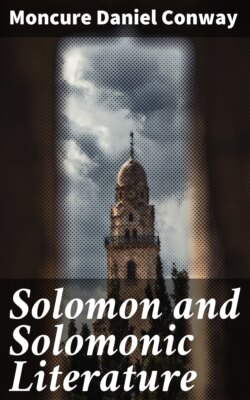Читать книгу Solomon and Solomonic Literature - Moncure Daniel Conway - Страница 3
На сайте Литреса книга снята с продажи.
Preface.
ОглавлениеTable of Contents
An English lady of my acquaintance, sojourning at Baalbek, was conversing with an humble stonecutter, and pointing to the grand ruins inquired, “Why do you not occupy yourself with magnificent work like that?” “Ah,” he said, “those edifices were built by no mortal, but by genii.”
These genii now represent the demons which in ancient legends were enslaved by the potency of Solomon’s ring. Some of these folk-tales suggest the ingenuity of a fabulist. According to one, Solomon outwitted the devils even after his death, which occurred while he was leaning on his staff and superintending the reluctant labors of the demons on some sacred edifice. In that posture his form remained for a year after his death, and it was not until a worm gnawed the end of his staff, causing his body to fall, that the demons discovered their freedom.
If this be a fable, a modern moral may be found by reversing the delusion. The general world has for ages been working on under the spell of Solomon while believing him to be dead. Solomon is very much alive. Many witnesses of his talismanic might can be summoned from the homes and schools wherein the rod is not spared, however much it spoils the child, and where youth’s “flower of age” bleaches in a puritan cell because the “wisest of men” is supposed to have testified that all earth’s pleasures are vanity. And how many parents are in their turn feeling the recoil of the rod, and live to deplore the intemperate thirst for “vanities” stimulated in homes overshadowed by the fear-of-God wisdom for which Solomon is also held responsible? On the other hand, what parson has not felt the rod bequeathed to the sceptic by the king whom Biblical authority pronounces at once the worldliest and the wisest of mankind?
More imposing, if not more significant, are certain picturesque phenomena which to-day represent the bifold evolution of the Solomonic legend. While in various parts of Europe “Solomon’s Seal,” survival from his magic ring, is the token of conjuring and fortune-telling impostors, the knightly Order of Solomon’s Seal in Abyssinia has been raised to moral dignity by an emperor (Menelik) who has given European monarchs a lesson in magnanimity and gallantry by presenting to a “Queen of the South” (Margharita), on her birthday, release of the captives who had invaded his country. While this is the tradition of nobility which has accompanied that of lineal descent from the Wise Man, his name lingers in the rest of Christendom in proverbial connexion with any kind of sagacity, while as a Biblical personality he is virtually suppressed.
In one line of evolution,—whose historic factors have been Jahvism, Pharisaism, and Puritanism,—Solomon has been made the Adam of a second fall. His Eves gave him the fruit that was pleasant and desirable to make one wise, and he did eat. Jahveh retracts his compliments to Solomon, and makes the naïve admission that deity itself cannot endow a man with the wisdom that can ensure orthodoxy, or with knowledge impregnable by feminine charms (Nehemiah xiii.); and from that time Solomon disappears from canonical Hebrew books except those ascribed to his own authorship.
That some writings attributed to Solomon,—especially the “Song of Songs” and “Koheleth” (Ecclesiastes),—were included in the canon, may be ascribed to a superstitious fear of suppressing utterances of a supernatural wisdom, set as an oracle in the king and never revoked. This view is confirmed and illustrated in several further pages, but it may be added here that the very idolatries and alleged sins of Solomon led to the detachment from his personal self of his divinely-conferred Wisdom, and her personification as something apart from him in various avatars (preserving his glory while disguising his name), an evolution culminating in ideals and creeds that have largely moulded Christendom.
The two streams of evolution here suggested, one issuing from the wisdom books, the other from the law books, are traceable in their collisions, their periods of parallelism, and their convergence,—where, however, their respective inspirations continue distinguishable, like the waters of the Missouri and the Mississippi after they flow between the same banks.
The present essays by no means claim to have fully traced these lines of evolution, but aim at their indication. The only critique to which it pretends is literary. The studies and experiences of many years have left me without any bias concerning the contents of the Bible, or any belief, ethical or religious, that can be affected by the fate of any scripture under the higher or other criticism. But my interest in Biblical literature has increased with the perception of its composite character ethnically. I believe that I have made a few discoveries in it; and a volume adopted as an educational text-book requires every ray of light which any man feels able to contribute to its interpretation.
